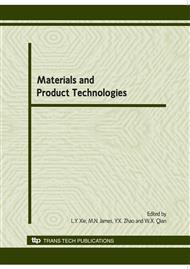[1]
M. Pecht. Prognostics and Health Management of Electronics, Wiley-Interscience, NY(2008).
Google Scholar
[2]
Jie Gu, Daniel Lau and M. Pecht: IEEE RAMS, Chongqing(2009), pp.912-919.
Google Scholar
[3]
IEEE Standard 1413. 1. IEEE Guide for Selecting and Using Reliability Predictions Based on IEEE 1413, NY(2002).
DOI: 10.1109/ieeestd.2003.94232
Google Scholar
[4]
N. Vichare: Prognostics and health management of electronics by utilizing environmental and usage loads, University of Maryland, USA(2005).
Google Scholar
[5]
J. Gu and M. Pecht: IEEE RAMS, Las Vegas(2008), pp.481-487.
Google Scholar
[6]
S. Mathew: Health status assessment methodology for electronic hardware, University of Maryland, USA(2005).
Google Scholar
[7]
J. Gu, D. Barker and M. Pecht: Microelectronics Reliability, Vol. 47(2007), pp.1849-1856.
Google Scholar
[8]
S. Kumar, M. Torres, M. Pecht and Y. C. Chan: Intelligence for Anomaly Detection, Diagnosis, and Prognosis, Hong Kong(2008).
Google Scholar
[9]
C. Sankavaram, B. Pattipati, A. Kodali, K. Pattipati, M. Azam, S. Kumar and M. Pech: IEEE Conference on Automation Science and Engineering, India(2009), pp.96-101.
DOI: 10.1109/coase.2009.5234108
Google Scholar
[10]
S. F. Cheng and M. Pecht: IEEE Conference on Automation Science and Engineering Bangalore, India(2009), pp.102-107.
Google Scholar
[11]
N. Vichare, P. Rodgers, V. Eveloy, M. Pecht1: Quality Technology & Quantitative Management, Vol. 4 (2007), pp.235-250.
Google Scholar
[12]
S. Kumar and M. Pecht: IEEE Transactions on components and packaging technologies, Vol. 32 (2009), pp.667-676.
Google Scholar
[13]
N. Vichare and M. Pecht: IEEE Transactions on Components and Packaging Technologies, Vol. 29 (2006): 222-229.
Google Scholar
[14]
Sathyanarayan Ganesan, V. Eveloy, D. Das and M. Pecht: IEEE Workshop on Accelerated Stress Testing & Reliability, Austin(2005).
Google Scholar
[15]
S. Mathew, D. Das, R. Rossenberger and M. Pecht: International Conference on Prognostics and Health Management(2008), pp.1-6.
DOI: 10.1109/phm.2008.4711438
Google Scholar
[16]
Jin Qin: A new physics-of-failure based VLSI circuits reliability simulation and prediction methodology, University of Maryland, USA(2007).
Google Scholar
[17]
J. Gu, N. Vichare, E. Tinsley, M. Pecht: IEEE Transactions on components and packaging technologies, 32(3)(2009), pp.550-556.
DOI: 10.1109/tcapt.2009.2013202
Google Scholar


